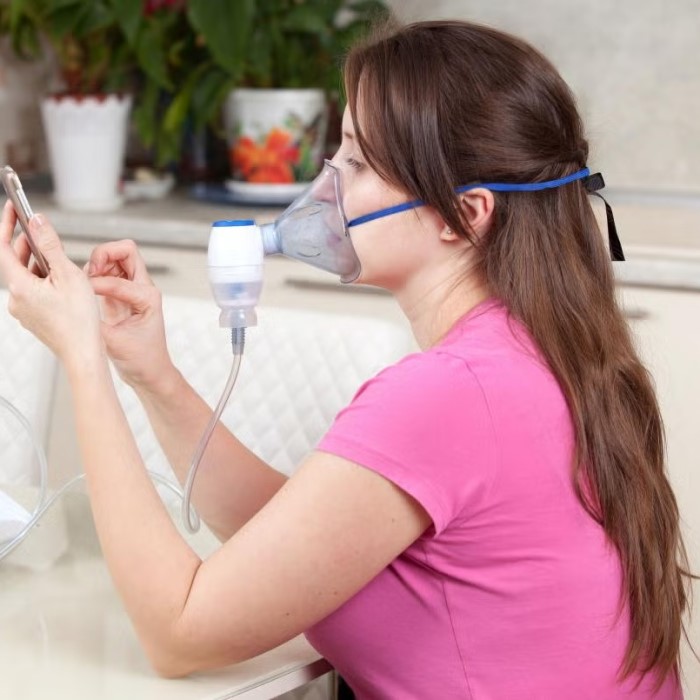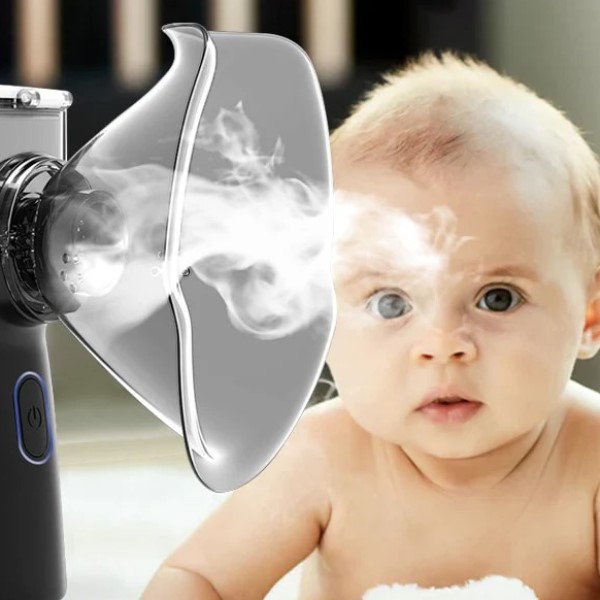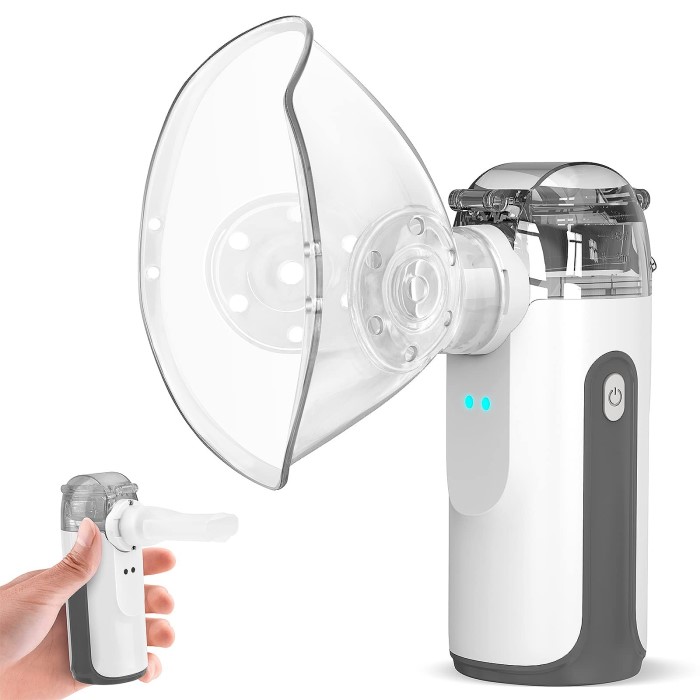Introduction
When it comes to managing a persistent cough or respiratory discomfort, nebulizers can play a pivotal role in providing relief. A portable nebulizer delivers medication directly to the lungs by converting liquid medications into a fine mist. This method allows for more effective and faster absorption compared to oral medications. Understanding what to put in nebulizer for cough is essential for maximizing its efficacy and ensuring a more comfortable experience.

Overall, nebulizers have gained popularity as a convenient and effective option for delivering medication. For individuals with conditions like asthma, bronchitis, and allergies, knowing the right solutions for your nebulizer can significantly enhance your health. This article will delve into the various natural and prescription options for use in a nebulizer, helping you make informed decisions about your cough treatment plan.
How Nebulizers Work: A Brief Overview
Before we dive into what you can put in a nebulizer, it is important to understand how these devices work. A nebulizer is a medical device that transforms liquid medicine into an aerosol mist, allowing for easy inhalation. Here’s how it typically operates:
- Medication Preparation: You will begin with a liquid solution prescribed by your doctor or an over-the-counter saline solution.
- Inhalation Process: The nebulizer creates a fine mist that can be inhaled through a mouthpiece or face mask. Users generally sit comfortably while inhaling the medication, which can take from 5 to 15 minutes.
- Direct Delivery: The medicated mist travels directly to your lungs, providing relief from respiratory distress. This direct delivery system means faster action and fewer side effects compared to pills.
By using a nebulizer, you can quickly address symptoms such as wheezing, coughing, and shortness of breath. But the effectiveness of a nebulizer relies heavily on the choice of liquid to be nebulized.
Natural Options for Cough Relief in a Nebulizer
Many users opt for natural remedies when thinking about what to put in nebulizer for cough relief. While it’s always best to consult a healthcare professional, here are some commonly used natural options:
1. Saline Solution
Saline solution is perhaps the most common substance used in nebulizers. This simple mixture of salt and water helps to hydrate the airways, lubricate the throat, and thin mucus. Here are some benefits of using saline:
- Moisturization: Saline helps keep the airways moist, providing soothing relief for dry coughs caused by irritation.
- Mucus Clearance: By thinning the mucus, saline can help clear congestion, making it easier for patients to breathe.
Using saline in a nebulizer is typically safe, and many healthcare professionals recommend it as a foundational treatment. It’s important to choose a sterile solution designed specifically for nebulization to avoid potential irritation.
2. Essential Oils (Use With Caution)
Some individuals incorporate essential oils into their nebulizer treatments; however, this should be approached cautiously. Oils like eucalyptus or peppermint may temporarily relieve coughing and soothe irritated airways. Always follow these suggestions when considering essential oils:
Dilution
- Importance of Dilution: Concentrated essential oils are potent and should never be used in their undiluted form.
- Prevention of Irritation: Proper dilution is crucial to prevent skin irritation, allergic reactions, or respiratory issues that may arise from using undiluted oils.
- Dilution Ratios: Familiarize yourself with recommended dilution ratios based on the intended use (e.g., topical application, diffusion) and the specific essential oil being used.
- Carrier Oils: Use appropriate carrier oils or bases, such as jojoba oil, coconut oil, or almond oil, for dilution, as they help to safely disperse the essential oils.
- Testing for Sensitivity: Conduct a patch test on a small area of skin after dilution to check for any adverse reactions before broader application.
Consultation
- Professional Guidance: Always seek the advice of a qualified healthcare professional or a certified aromatherapist to ensure safe use of essential oils.
- Personalized Recommendations: A healthcare provider can help assess your individual health situation and provide tailored recommendations based on any underlying conditions or medications.
- Risk Awareness: Consulting with a professional helps to identify any potential risks or contraindications associated with specific essential oils, especially for pregnant individuals or those with certain medical conditions.
- Education on Usage: Engage with professionals to learn about proper application methods, potential reactions, and safe practices related to essential oil use.
Using essential oils in a nebulizer is not universally recommended, and some oils could cause irritation rather than relief. It’s vital to research or seek guidance before using this method.
3. Herbal Infusions
Another natural option some may explore is herbal infusions. Certain herbs, such as chamomile or thyme, have anti-inflammatory properties, which may help soothe the throat. However, it’s essential to keep in mind:
Preparation
- Proper Method: Herbal infusions need to be prepared with care to ensure the effectiveness of the treatment.
- Filtering Particulates: It is essential to filter out any particulate matter from the infusion. This step is crucial to prevent clogging in the nebulizer, which can impede its functionality and lead to uneven delivery of the herbal solution.
- Infusion Strength: Consider the concentration of the herbal infusion, as too strong a mixture may lead to undesirable effects when nebulized.
- Storage Conditions: Store prepared infusions appropriately to maintain their integrity without degradation of their beneficial properties before use.
Safety
- Consultation Requirement: Always seek advice from a qualified healthcare professional or herbalist before using herbal materials in a nebulizer.
- Individual Variation: Understand that safety and effectiveness can vary significantly from person to person based on individual health conditions, allergies, and sensitivities.
- Potential Risks: Be aware that certain herbs may have adverse effects, especially when vaporized, and may interact with medications or exacerbate existing health issues.
- Follow Guidelines: Ensure adherence to any specific guidelines or recommendations provided by healthcare professionals regarding dosage and usage methods.
While these herbal treatments could provide temporary relief, they should be considered supplementary and not a replacement for prescribed treatments.
Prescription Medications for Cough in a Nebulizer
For more severe or chronic coughs, health professionals often prescribe medications specifically tailored to address respiratory conditions. Here are some common prescription options that can be nebulized:
1. Bronchodilators
Bronchodilators are essential medications that relax the muscles around the airways, making breathing easier. Common examples include albuterol and levalbuterol.
These medications are beneficial for patients experiencing acute asthma attacks or those with chronic obstructive pulmonary disease (COPD). One of the essential features of bronchodilators is their rapid onset of action, often resulting in immediate relief from symptoms such as shortness of breath and wheezing. Users typically report noticeable improvements within minutes after inhalation.
2. Corticosteroids
For inflammation in the airways, corticosteroids can be prescribed. Medications like budesonide help to reduce swelling and irritation in the lungs. They are particularly effective for individuals with persistent cough due to chronic inflammatory diseases such as asthma.
While corticosteroids can take longer to show effects compared to bronchodilators, they play a critical role in managing ongoing symptoms. Using corticosteroids in conjunction with bronchodilators can provide a comprehensive treatment plan.
3. Combination Medications
Some patients may benefit from combination medications that include both a bronchodilator and a corticosteroid. These medicines are designed to provide both immediate relief and long-term control over symptoms.
The convenience of having a single inhalation therapy option that combines two different therapeutic approaches can improve patient compliance and overall health outcomes.
What Liquid Do I Put in a Nebulizer?
When determining what to put in a nebulizer, it’s essential to choose the appropriate liquids based on your health needs and the recommendations of healthcare professionals. Here are a few key points to consider:
- Sterility: Any liquid used should be sterile, especially for individuals with compromised immune systems.
- Solution Type: Use only medications prescribed by a healthcare provider or saline solutions specifically designed for nebulization. Avoid using any homemade or unapproved mixtures.
- Dosage and Preparation: It’s crucial to follow the dosage suggested by healthcare providers regarding how much and which solution to use in your nebulizer.
FAQs About Using Nebulizers for Cough Relief
What medicine to put in a nebulizer for a cough?
For cough relief, bronchodilators like albuterol or corticosteroids like budesonide are commonly recommended. Consult your healthcare professional for the best medication based on your conditions.
Is it okay to use a nebulizer with just saline?
Yes, using saline in a nebulizer is perfectly safe and offers benefits for moisturizing the airways and thinning mucus, which can help relieve cough.
What can I nebulize to clear my lungs?
Saline solution, prescribed bronchodilators, and mucus-thinning agents are commonly nebulized options to help clear the lungs and make breathing easier. Always consult your doctor when choosing a method.
Conclusion: Making the Right Choice for Cough Relief
In summary, understanding what to put in nebulizer for cough is essential for effective and rapid treatment. Both natural and prescription options can play a vital role in managing cough symptoms effectively. Saline solutions offer a reliable and easy solution, while medically prescribed options provide targeted relief for more severe symptoms.
It’s vital to consult healthcare professionals before starting any new treatment regimen, especially when it involves using a nebulizer. The right solution can make all the difference in achieving better respiratory health. Explore your options carefully to discover the best strategies for managing your cough, and breathe easier knowing that effective relief is within reach. Always prioritize your health and reach out to your healthcare provider for guidance and support. With the right tools, you can take control of your respiratory health and improve the quality of your everyday life.



